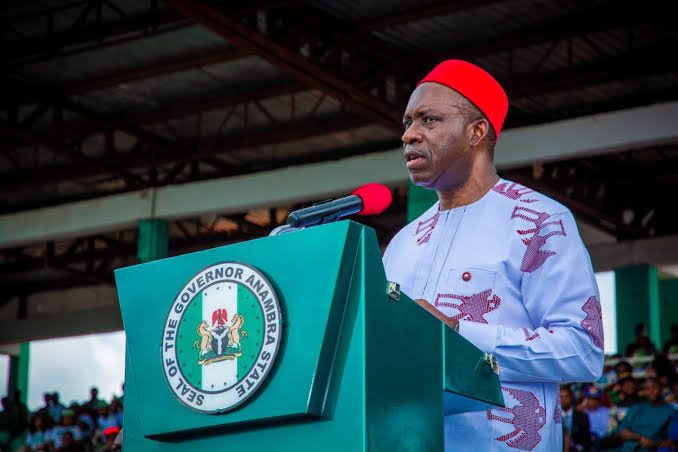
The Anambra State Government, on Tuesday, announced its decision to withdraw from the suit that is seeking to declare the operations of the Economic and Financial Crimes Commission, EFCC, illegal, News360 Nigeria reports.
The state, through its Attorney General, Prof. Sylvia Ifemeje, told the Supreme Court that it was no longer willing to be a part of the legal action that was originally instituted by Kogi state.
The withdrawal notice was dated October 20.
Anambra took the position on a day that Osun state, through its Attorney-General, Mr. Oluwole Bada, applied to be allowed to consolidate its grievance against the operations of the EFCC, with that of Kogi state.
Osun state told a seven-man panel of the apex court led by Justice Uwani Abba-Aji, that it is seeking the same reliefs that Kogi state listed against the EFCC.
Whereas Sokoto state, which was earlier joined as a co-plaintiff in the matter, did not send any legal representative at the resumed proceeding on Tuesday, other states that announced their appearances, were; Kogi, Kebbi, Katsina, Jigawa, Oyo, Benue, Plateau, Cross River, Ondo, Niger, Edo and Bauchi.
Others were; Adamawa, Taraba, Ebonyi, Imo and Nasarawa.
The Attorney-General of the Federation and Minister of Justice, Prince Lateef Fagbemi, SAN, appeared as the sole defendant in the matter.
The AGF did not oppose Anambra state’s request to pull out of the case.
It will be recalled that 16 states of the federation had approached the Supreme Court to challenge the operations of the EFCC.
The states are contending that the anti-graft agency was not validly established by the then administration of President Olusegun Obasanjo.
It will be recalled that the EFCC was established by an Act of the National Assembly on December 12, 2002, by Obasanjo’s administration.
Following the appointment and confirmation of its pioneer Executive Chairman, Mallam Nuhu Ribadu and other administrative officers, by the Senate, the Commission commenced its operational activities on April 13, 2003, though its Establishment Act was later amended in 2004.
However, in the suit before the apex court, the states, through their respective Attorneys General, argued that section 12 of the 1999 Constitution, as amended, was not complied with before the EFCC began its operations.
According to the plaintiffs, it was a mandatory provision of the Constitution that majority of the Houses of Assembly of States must vote and agree to the passage of the EFCC Act, insisting that it was not something that only the National Assembly was legally allowed to do.
They told the Supreme Court that none of the states was carried along before the EFCC was established by the then President Obasanjo’s administration.
They argued that the Supreme Court had in a decided case-law in Dr. Joseph Nwobike Vs Federal Republic of Nigeria, held that it was a United Nation Convention against corruption that was reduced into the EFCC Establishment Act and that in enacting this law in 2004, the provision of Section 12 of the 1999 Constitution, as amended, was not followed.
The plaintiffs maintained that since the due process was not followed before the EFCC Establishment Act was enacted, it cannot be applicable in states that never approved of it, in accordance with provisions of the 1999 Constitution, as amended.
They argued that any agency that was formed as a result of the Act, ought to be regarded as an illegal institution.
The 16 states are relying on the fact that since the 1999 Constitution, as amended, is the supreme law of the land, any Act of the National Assembly that is inconsistent with the Constitution, ought to be declared a nullity.
Kogi state had specifically raised six questions for the apex court to determine, even as it sought nine principal reliefs.
It, among other things, prayed the Supreme Court for: “A declaration that the Economic and Financial Crimes Commission (EFCC), the Nigerian Financial Intelligence Unit (NFIU) or any agency of the Federal Government of Nigeria cannot investigate, requisition documents, invite and or arrest anyone with respect to offences arising from or touching on the administration and management of funds belonging to Kogi state of Nigeria or any Local Government Area of Kogi State.”
As well as: “A declaration that the Federal Government of Nigeria, through the Nigerian Financial Intelligence Unit (NFIU) or any agency of the Federal Government, lacks the power to issue any directive, guideline, advisory or any instrument howsoever called for the administration and management of funds belonging to Kogi State of Nigeria or any Local Government Area of Kogi state.”
Now Playing: Love Bug
Aretti Adi
SPONSORED LINKS
LOAN FOR TRAVEL, VISA, JAPA, PoF UP TO N200M (CLICK HERE)
[CLICK HERE] For Music Artwork, Website Design And SEO Setup
INSTALL 9JAFLAVER MUSIC APP, STREAM, DOWNLOAD, AND PLAY MUSIC OFFLINE
CHECK OUT FUNNY PICTURE AND MEME HERE (CLICK HERE)
Chissom Anthony – Glory To God In The Highest [See Trending Gospel Song]
Copyright © 2014-2026 9jaflaver. All Rights Reserved.
About us | DMCA | Privacy Policy | Contact us
| Advertise| Request For Music | Terms Of Service
9jaflaver is not responsible for the content of external sites.